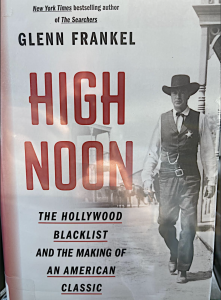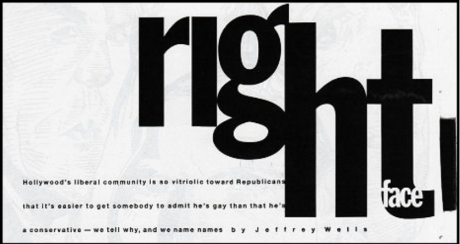Three days ago I began tearing through Glenn Frankel‘s “High Noon: The Hollywood Blacklist and the Making of an American Classic,” an essential, smoothly readable history (published in February 2017) of the legendary Carl Foreman.
The book focuses on Hollywood’s traumatic, ethically fraught Red Scare era of the late ’40s and ’50s, and particularly the trials and tribulations of this once-blacklisted producer and author of High Noon‘s allegorical screenplay as well as several other classic, hard-hitting films (Champion, Home of the Brave, Young Man with a Horn, The Men, A Hatful of Rain, The Bridge on the River Kwai, The Guns of Navarone, The Victors).
I thought I knew the High Noon saga top to bottom, but Frankel’s well-researched book taught me quite a few things.
I finished it last night, and immediately wanted to re-watch Lionel Chetwynd‘s Darkness at High Noon: The Carl Foreman Documents (’02), a two-hour PBS documentary that dug into more or less the same Foreman saga.
I hadn’t seen Chetwynd’s film since an invitational Academy screening 21 years ago, but I keenly recall the excitement and controversy.
The controversy stemmed from Chetwynd’s doc having delivered a persuasive, highly damning portrait of High Noon producer Stanley Kramer, who went on to direct a string of urgent and respected social-political dramas including The Defiant Ones, On The Beach, Inherit the Wind and Judgment at Nuremberg.
Chetwynd’s film (assembled from Foreman’s corner) accused Kramer of cowardice and personal betrayal, and there wasn’t much of an argument to be made as Chetwynd had done his homework and then some.

I recall praising Darkness at High Noon in my then four-year-old column, which was then berthed at reel.com. The film is narrated by Richard Crenna with Foreman’s first-hand account read by Richard McGonagle.
My initial search this morning yielded a YouTube version that was posted a year ago by Carl’s daughter, Dr. Amanda Foreman. Alas, it looks like hell due to having been horizontally taffy-pulled. Chetwynd’s original version was composed in 1.37.
I’m figuring that a version that represents the original aspect ratio has to be accessible. (A MUBI version has disappeared.) I’ve just reached out to Chetwynd, etc.
From Todd McCarthy’s 4.10.02 Variety review of Chetwynd’s film: “Pic pivots on the charge that Kramer essentially robbed Foreman of his rightful credit as producer of High Noon after the latter had left the U.S. for England to escape the snare of the blacklist (his writing credit was protected by the Writers Guild).
“After firmly establishing Foreman’s right to that credit on what was bannered ‘A Stanley Kramer Production’ and demolishing the long-standing rumor that the film’s much-noted cutaways to clocks to reassert its real-time structure were not in the script but added in post-production, Chetwynd backtracks to relate his protagonist’s biography, from Chicago upbringing and apprenticeship in Frank Capra‘s WWII filmmaking unit to rising late ’40s screenwriting rep on Home of the Brave, Champion and The Men.
“That outspoken Hollywood conservative Chetwynd should be taking up the cause of former Communist Party member Foreman may raise an eyebrow or two. But the doc assumes a vigorously pro-Foreman position not only in opposition to HUAC but especially against [Kramer’s] alleged weak-spined duplicities.
“Kramer’s family is now disputing the film’s characterization of him, and while his side of the story goes unrepresented here, the sort of thorough documentation Chetwynd offers on Foreman’s behalf will be hard to refute.”
I had gotten to know Chetwynd in ’94 and early ’95 while writing a long Los Angeles magazine article titled “Right Face“. It focused on various Hollywood actors and screenwriters who had experienced varying degrees of suspicion and discrimination due to being conservatives in an overwhelmingly liberal town.













